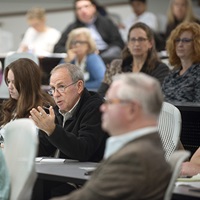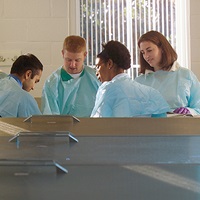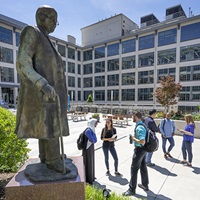 Learning for a Lifetime
Learning for a Lifetime
From learning new procedures and techniques to maintaining licensure, Wake Forest School of Medicine graduates continuously learn to keep serving patients. To help alumni, leaders at the School of Medicine are working to define lifelong learning opportunities for graduates of all medical programs.
Read more ...
 Innovative Education Keeps Alumni a Step Ahead
Innovative Education Keeps Alumni a Step Ahead
Winston-Salem's Innovation Quarter, with its entrepreneurial academic environment, and interprofessional education across the MD, Nurse Anesthesia, PA and Biomedical Science Graduate programs combine to create stellar learning culture throughout Wake Forest School of Medicine.
Read more ...
 Gift of Life Supports Patient Care, Research
Gift of Life Supports Patient Care, Research
Benefits of whole-body donation go beyond the anatomy lab to support educational needs and enable experienced health care providers to learn and practice clinical skills and procedures.
Read more ...
 Alumnus Reflects on Advancements in Medical Education
Alumnus Reflects on Advancements in Medical Education
Edgar Marks, MD, was one of the first graduates of Wake Forest School of Medicine after it moved to Winston-Salem in 1941.
Learn more ...
 Medical Students Ride Along with Paramedics in EMS Elective Course
Medical Students Ride Along with Paramedics in EMS Elective Course
Two Wake Forest School of Medicine graduates discuss their experiences participating in an emergency medical services elective course.
Learn more ...
